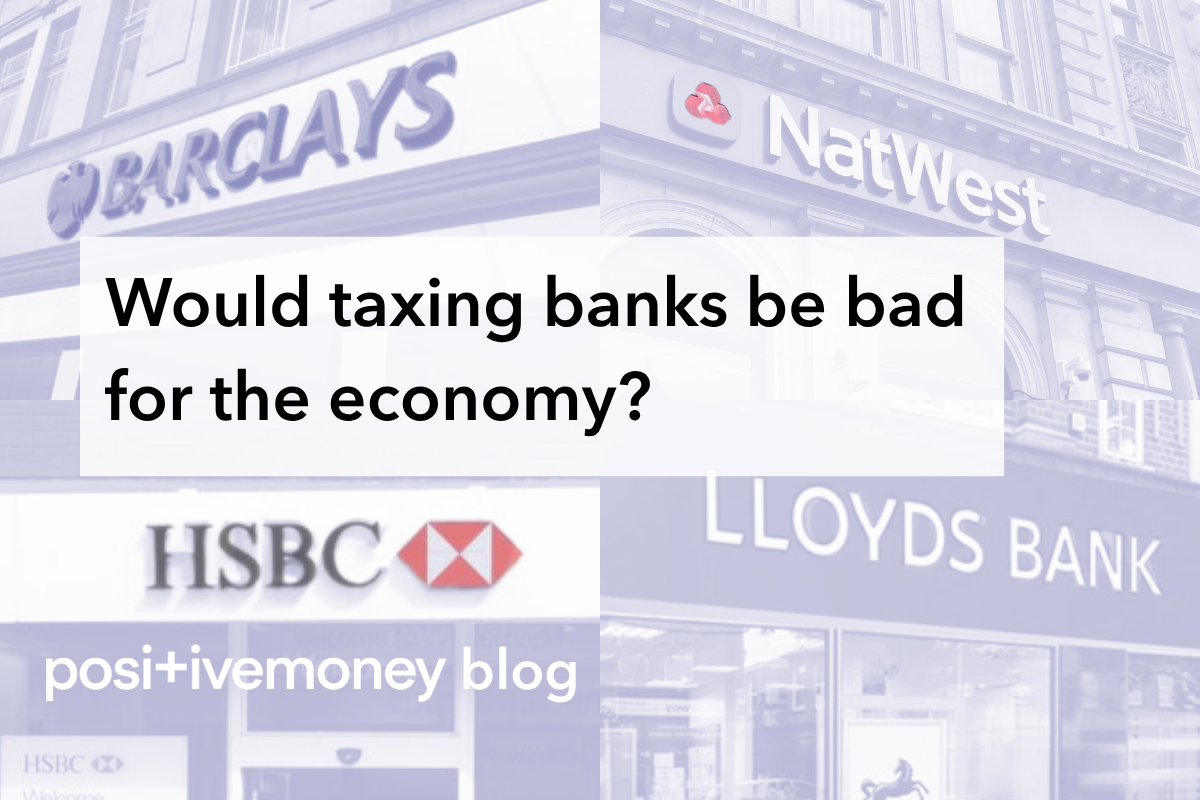
UKGlobal
27 January 2026
Higher taxes on banks’ windfall profits are supported by the public, but naturally opposed by bank CEOs. We respond to the misleading claims made by bankers and their lobbyists.
As Thatcher wrote, justifying her government’s windfall tax on banks in the 1981 Budget: “Naturally, the banks strongly opposed this; but the fact remained that they had made their large profits as a result of our policy of high interest rates rather than because of increased efficiency or better service to the customer.” This remains the case today.
When NatWest reported higher than expected profits, chief executive Paul Thwaite warned against higher taxes with the soundbite of “strong economies need strong banks.”
Yes, it is true that bank lending is hugely important for the economy, and that banks need to be able to turn a profit if they are to continue to lend. Taxing windfalls will still leave banks profitable, with sufficient income to cover their costs. Moreover, while banks must be profit-making, this is not an excuse for them to be profit-maximising, especially when these profits are being maximised at the expense of the public.
By not passing on the windfalls paid by the Treasury to customers, banks are essentially using their monopoly position in issuing the money used by the public to make payments to extract huge economic rents. Economists of all stripes should agree that such pure rents represent a burden on the economy and are the ideal target for taxation. Barclays chief CS Ventatakrishnan may complain that banks are already “among the biggest taxpayers in the country”, but this really reflects that banks are among the biggest rentiers in the country, and if their rents rise so should taxes.
The Barclays CEO also claimed that the bank would reduce lending if it had to pay more tax, as it “wouldn’t have as much capital to reinvest back into the system”, an argument echoed by his counterpart at HSBC, Georges Elhedery, who also warned that higher taxes risked “eroding our investment capacity”. This argument would perhaps have some weight if banks weren’t otherwise choosing to erode their own investment capacity by frittering away capital on payouts to shareholders. The UK’s big four banks spent over £33bn on dividend payments and share buybacks in 2024. In effect, taxes on banks would recoup money being paid out to shareholders back to the public purse.
Furthermore, as Positive Money’s analyses have shown, only a tiny fraction of bank lending goes towards the real economy, with the vast majority of bank credit creation being used to bid up the price of pre-existing assets. A key factor for the UK’s poor economic performance is that its banking system is uniquely ill-equipped to support productive investment, as it is dominated by a handful of big publicly-listed banks who are compelled to maximise short-term returns for shareholders, and taking positions in existing assets typically offers a higher return on equity than investing in new capital formation, at least in the short-term. If the tax is targeted at banks above a certain threshold, as IPPR have suggested, it would actually help level the playing field between these shareholder banks and banks with different models which are more attuned to the needs of their communities.
Lobby group UK Finance has argued that “Adding another tax would make the UK less internationally competitive”, with the implication presumably being that the UK would lose business to other countries.
Though we have argued that the government shouldn’t prioritise the competitiveness and growth of financial services, as this would see other economic, social and environmental goals sacrificed for the interests of the City of London, it is possible to recoup transfers to banks without affecting the sector’s international competitiveness.
Positive Money has proposed a tax on domestic retail net income specifically, so that other parts of banks’ business, such as global operations or investment banking, are unaffected. This would capture the windfalls banks have made at the expense of the British public, while eliminating any possible incentive for banks to move operations abroad. If a bank exits the UK retail banking market, their assets and liabilities, as well as profits and tax liabilities, would simply be acquired by a competitor - nothing of real value would be lost for the UK, and equally nothing of value would be gained for the exiting bank.
Likewise, the IPPR’s proposal is targeted at interest received on central bank reserves, so it would not affect income from other sources.
Banks' share prices have doubled since interest rates started rising at the end of 2021, as a result of windfall profits.
As higher taxes on banks would be recouping windfalls that would otherwise be paid out to shareholders, it is likely that bank share prices would lose some of their recent gains. Crucially, this would be reflected in prices for shares traded on the secondary market, and so banks’ capital and thus ability to lend would only be affected if banks are required to raise more capital through new share issuances. As the Bank of England maintains, banks are well-capitalised, and they are required to set aside money for losses, so it is unlikely that banks will find themselves needing to raise more equity capital, outside of a crisis. Moreover, the market value of bank shares has consistently traded below the book value of their assets, and this does not seem to have affected banks’ ability to lend.
Therefore, we're calling on the Chancellor to implement a windfall tax on bank profits in the Autumn Budget. To join us, add your name to our petition to #TaxTheBanks.
Sign-up to our mailing list for regular updates, or donate to support our work to redesign our economic system for social justice and a liveable planet.
